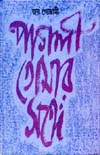|
The book touch me most:

|
Imagine a huge canvas and on it an artist painting away the various shades of emotions and thoughts of human beings, of you and me, in resplendent colours. If you are confused, then let me tell you that I'm, at the moment, referring to the book 'Paglee Tomar Sange' which has in store a collection of forty-three poems painted by the legendary Bengali poet Joy Goswami.
The book that has won 'Sahitya Academy' award reflects the true genius of the legend. Joy Goswami has once again composed his poetry in such clear and lucid way that while reading them, one can clearly visualise the effect of art in them.
The unique feature about Joy's poetry is that he writes them with a lot of passion, which is well complemented by a sense or brutal honesty. This has been aptly portrayed in all the verses in 'Paglee Tomar Sange'. The very first poem 'Ma Aar Meiti' is about the daughter, a young lady, in love, who goes into her own fantasyland.
In her world she knows of all the possible roads in the universe, she can pluck all the lights that the world has to offer and she believes that she is a sky full of stars. Her fantasy was brutally brought down to reality by her snubbing mother when she says, "Poramukhi du chokher bish / Pher tui premey porechis?" If noted carefully, there is presence of subtle humor.
Another romantic poem has been interestingly named 'Kukurchhanader Golpo'. The whole poem is in the form of a dialogue. Joy merely uses the characters of the dogs as ornaments to a strong emotional build up that takes place in the man's heart for the woman in the course of their casual conversation. This gives vent to an irrepressible desire in the man to love the woman, to care for her.
On the other hand, 'Sparsha' offers the conventional flavour of romance. This masterpiece invokes a lot of passion. The passion that can touch without touching; the passion that has no expectation, no questions asked about and no reason behind it. That kind of silent passion promises the comfort of Heaven, a passion, which is again irrepressible!
In his collection, Joy has also highlighted some of the social problems. In one of his poem 'Ragging' which has been written quite playfully, there is an under-current of a serious and deep-rooted message that screams out of its menace to the society.
'Mashipishi' and 'Chokh Paltey Koi' are two poems about ordinary, working class people. They have been written very simply and objectively. There has been no exaggeration of pain or sufferings of the ordinary people nor is there any political fragrance attached to them. While describing the beauty of nature in his verses 'Ke janmay He Boisakh' he doesn't forget to mention the "Pochapukur", "Colony Math", the "Rail-line".
Here he tries to sketch the picture of the pain co-existing with the warmth of nature. In "Sukhna Patar Daley" he unfurls the beauty of "Bashanta". The poem "Panchali: Dampatikatha" is the one form which he draws the title of the book. This poem is a man's ode to his beloved whom he addresses very passionately as 'Paglee'. But I think it's a mere slogan of love. The best poetry of this book, I think, is 'Sabcheye UNchu Tarake ami Boli'. Here he has sketched himself very intimately. 'Sonar meye'(Golden girl) is still a sweet dream for him, for whom he cries, he writes, he bleeds. A poetic loneliness is revealed all over that poem, which attracts me most. With all those poems the book 'Paglee Tomar Sange' has become an epich and my favourite one.
|

